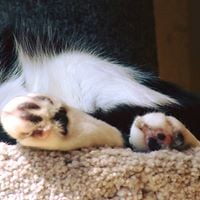Which of these animals is a native to sub-Saharan Africa for producing ''civetone'' in the perfume industry?
Sub-Saharan Africa is the area of the continent of Africa that lies south of the Sahara desert. The African civet is a large native to sub-Saharan Africa, where it is considered widely distributed in woodlands that have re-grown after a timber harvest. The African civet is primarily an animal characterized by being active during the night and sleeping during the day (nocturnal). The African civet has historically been hunted for the secretion of perineal scent glands containing ''civet oil''. This secretion is a white or yellow waxy substance called ''civetone'', which has been used as a basic ingredient for perfumes. The ''civetone'' is a ketone (R2C=O), where R is an alkyl radical containing carbon and hydrogen. ''Civetone'' is closely related to ''muscone'' (an organic compound), the principal odoriferous compound found in 'musk', a class of aromatic substances in perfumery.
Today, ''civetone'' can be synthesized from palm oil. The concentration of ''civetone'' in ''civet oil'' is between 2.5 and 3.5%. The African civets are kept in cages and they produce 3 to 4 grams of oils per week. The odour of ''civet oil'' is strong, but once diluted it is pleasantly and sweetly aromatic. It is prepared for use in perfumery by solvent extraction to yield either a tincture (10 to 20%) dissolved in ethyl alcohol. In Ethiopia, African civets are hunted alive and must die within three weeks after capture. Extraction of the ''civetone'' is cruel and has been criticised.
More Info:
en.wikipedia.org






